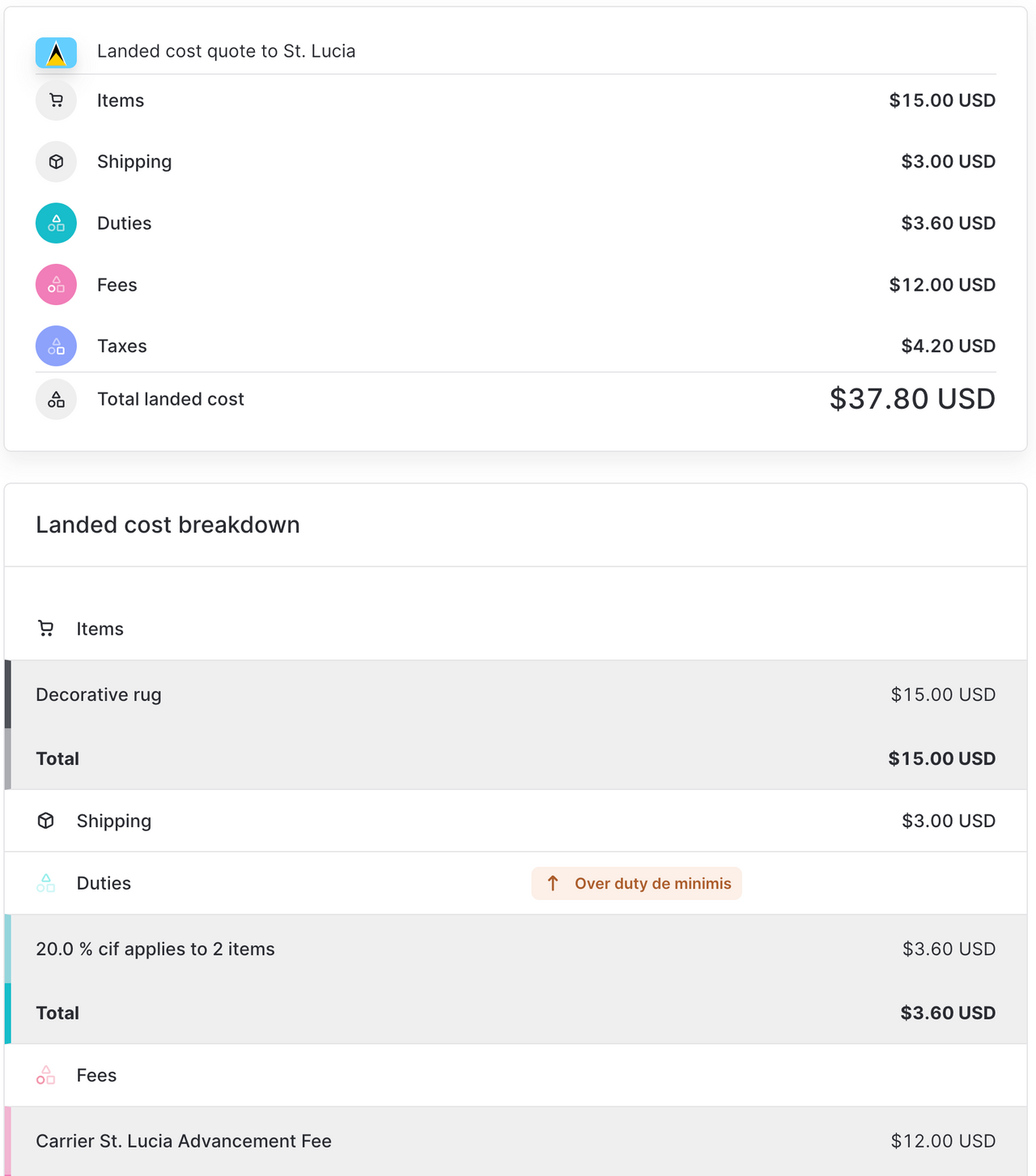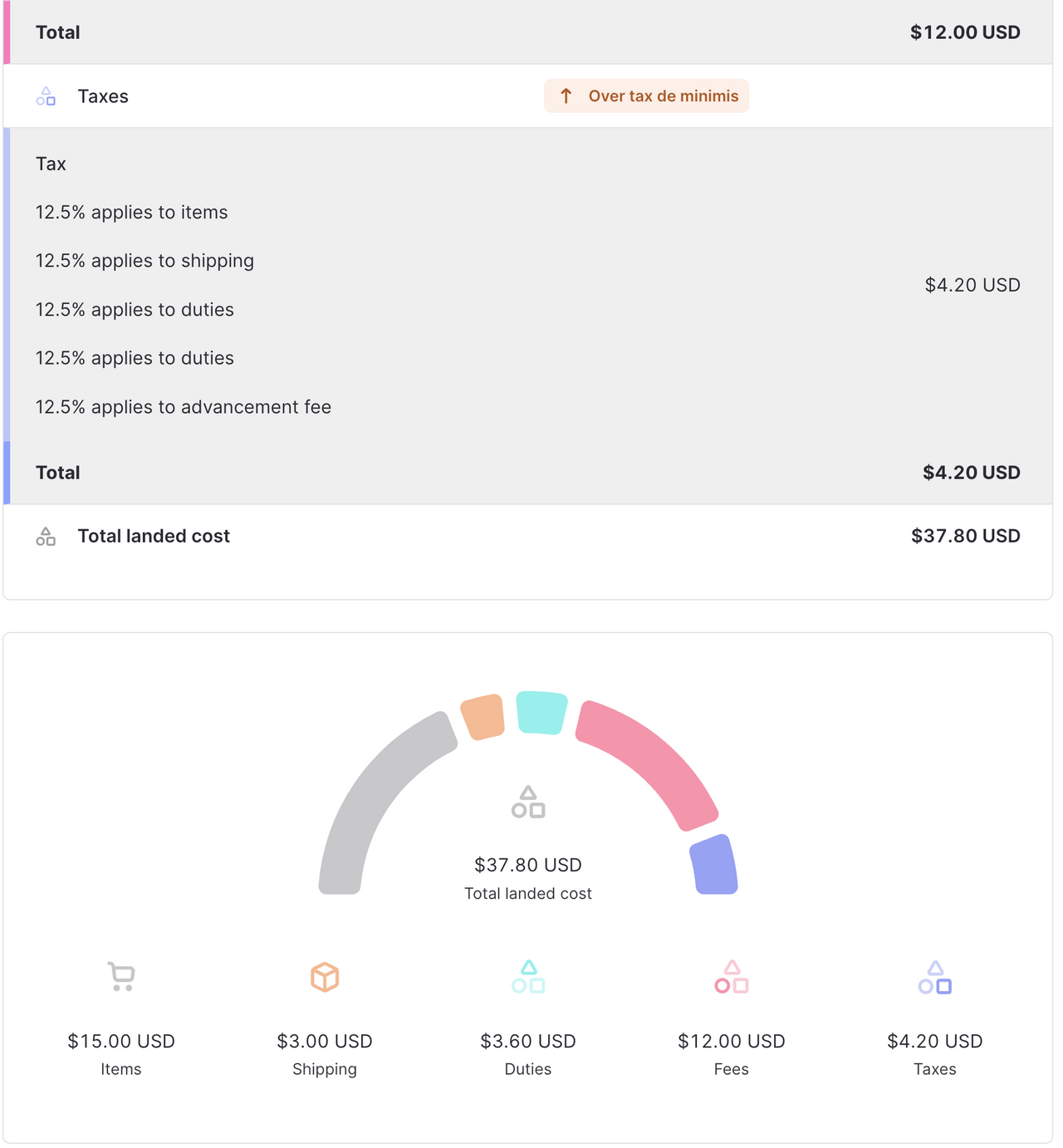Ease of importing goods score: F
Ease of doing business 2/5
- Saint Lucia’s foreign relations emphasize reciprocal economic cooperation and trade and investment. The country administers its foreign policy through its membership in regional organizations, including CARICOM.
- Business-to-consumer (B2C) packages are seldom delivered to the consumer's door, which can hurt your business' customer experience.
Landed cost fairness 2/5
- St. Lucia has a high VAT rate, extra fees, and no de minimis, making it more difficult and expensive to import.
- The lack of de minimis and fees are unfavorable for landed cost.
Flexibility of legal regulations 2/5
- Customs is strict about paperwork.
- Inaccurate documents can result in holds and fines.
Availability and accessibility of shipping 4/5
- All major carriers ship to St. Lucia, including DHL Express, FedEx, UPS, and USPS.
- However, St. Lucia is relatively small and remote.
Accessibility and variety of payment methods 4/5
- St. Lucia accepts most forms of ecommerce payment, such as international credit cards/bank cards.
Market opportunity 1/5
- St. Lucia has an extremely small population, which does not give sellers the potential for high ecommerce success.
- The internet penetration in St. Lucia relative to its population also limits the number of potential customers.
Key stats for St. Lucia
| Population | 179,857 (2022) |
| GDP | 1.97 billion USD (2022) |
| GDP per capita | 11,023 USD (2022) |
| Internet penetration | 56.8% of the population use the internet. |
| Ecommerce users | Popular ecommerce platforms in St. Lucia are eBay, Shopify, and Magento |
| Leading product categories | Crude petroleum, refined petroleum, cars, poultry meat, and petroleum gas |
| Preferred online payment method(s) | International credit cards/bank cards, cash upon delivery, PayPal, and other electronic money transfer services |
| Languages | English and Saint Lucian Creole French |
| Currency | East Caribbean Dollar/ XCD/ $ |
Landed cost for St. Lucia
The landed cost for a cross-border transaction includes all duties, taxes, and fees associated with the purchase. This includes:
- Product price
- Shipping
- Duties
- Taxes
- Fees (currency conversion, carrier, broker, customs, or government fees)
St. Lucian de minimis, tax, and duty
CIF: CIF (cost, insurance, freight) is a method for calculating import taxes where the tax is calculated on the cost of the order, plus the cost of freight, insurance, and seller's commission.
Further explanation of duty, tax, and de minimis is provided below
Duty and tax de minimis
- Duty and tax de minimis: 0 USD
Applied to the CIF value of the order
De minimis value
Duty and tax will be charged only on imports into St. Lucia where the total CIF value of the import exceeds St. Lucia’s minimum value threshold (de minimis). St. Lucia does not have a de minimis, which means duty and tax fees are charged on all imports. The only time goods are exempt from duty and tax is when they receive preferential treatment through trade agreements.
Import tax
- Average rate: 12.5%
Applied to the CIF value of the order
Value-added tax (VAT)
St. Lucia has a wide variation of value-added tax (VAT), which ranges from 0-70%, with an average VAT rate of 12.5% on the CIF value of the order imported.
Import duty
- Standard rate: 20%
Applied to the CIF value of the order
Average duty rates
Most product categories receive a duty rate of 20% applied to the CIF value of the order.
Any other import fees
There are additional fees that may apply to certain imports.
-
Customs service charge: 5%
-
Environmental levy: 1.5%
-
Excise duty: Varying rates
Landed cost example
Below is a sample landed cost breakdown for St. Lucia calculated using Zonos Quoter. Since there is no de minimis, duty and tax will always apply.
Landed cost for a shipment to St. Lucia:


Trade agreements
St. Lucia has at least 10 trade agreements that offer a zero or highly discounted duty rate for goods made in a participating country. The most prominent of these trade agreements are the CARICOM free trade agreements.
The Caribbean Community (CARICOM)
The CARICOM is the Caribbean community, comprised of 15 countries that have formed free trade agreements to facilitate economic integration and cooperation among its members, to ensure that the benefits of integration are equally shared, and to coordinate foreign policy.
What countries are included in CARICOM?
- Antigua and Barbuda
- The Bahamas
- Barbados
- Belize
- Dominica
- Grenada
- Guyana
- Haiti
- Jamaica
- Montserrat Saint Kitts and Nevis
- St. Lucia
- Saint Vincent
- The Grenadines
- Suriname
- Trinidad
- Tobago
St. Lucia gives duty-free access to imports from other CARICOM countries, given that the goods satisfy the rules of origin. Some exceptions are granted duty-free treatment under the safeguard provisions of the CARICOM Treaty, but preferential imported goods still incur the customs service charge.
Additional CARICOM agreements
- CARIFORUM (The Caribbean Forum)-EU (European Union) Economic Partnership Agreement (EPA): The duration of the EPA is indefinite and provides exporters of nearly all CARIFORUM-originated goods with duty and quota-free access to the EU market.
- CARICOM Canada Trade and Development Agreement: CARICAN (Caribbean and Canada agreement) provided duty-free tariff treatment. A new Canada and Caribbean agreement includes coverage of goods that were excluded from coverage under CARICAN, and is a long-term arrangement that ensures CARICOM’s access to the Canadian market.
For further information on St. Lucia’s CARICOM agreements visit: St. Lucia Trade Agreements
St. Lucia is a member of the World Trade Organization
St. Lucia is a member of the World Trade Organization (WTO). Therefore, St. Lucia must abide by the most-favored-nation (MFN) clause, which requires a country to provide any concessions, privileges, or immunities granted to one nation in a trade agreement to all other WTO member countries. For example, if a country reduces duties by 10% for one country, the MFN clause states that all WTO members will have their duties cut by 10% into that country.
Customs resources
St. Lucia’s Customs authority
Customs refund in St. Lucia
Note: Talk to your carrier about customs refunds.
Shipping and compliance
Top courier services:
- DHL Express
- FedEx
- UPS
- USPS
Depending on the courier, additional shipping fees may include the following:
- Tracking fee
- Insurance fee
- Fuel surcharge
- Remote delivery charge
- Signature fee
- Overweight or oversized fee
- Special handling fee
- Dangerous goods fee
Documentation and paperwork
Always required:
Sometimes required:
- Certificate of Origin (to receive any preferential treatment)
- Import licenses/import permits (as needed)
Special considerations for clearance
Shipments may require a CARICOM invoice. This is a special invoice used by some Caribbean countries and will be obtained from the consignee by the carrier through the customs website. When required, the shipment cannot clear Customs without this document. A shipment subject to CARICOM is considered a formal entry, and additional fees may apply.
Restricted, prohibited, and controlled items
Government agencies regulate imports.
Restricted items are different from prohibited items. Prohibited items are not allowed to be imported into a country at all. Restricted items are not allowed to be imported into a country unless the importer has approval or a special license that allows them. Controlled goods have military or national security significance.
Prohibited items:
- Counterfeit currency
- Food unfit for human consumption
- Indecent or obscene articles or matter
- Prepared opium and pipes or other smoking instruments
- Narcotics
- Pistol if apparatus capable of firing any kind of shot cartridge
- Flick knives and blades
- All publications associated with black magic
- And more
Restricted items:
- Arms and ammunition
- Explosives
- Handcuffs
- Radio and television transmitting equipment
- Cannabis
- Tear gas
- Any goods bearing the Coat of Arms of the Flag of St. Lucia
- Rare/threatened species of animals and/or plants
- Chain saws
- And more
Tips for exporting from St. Lucia
St. Lucia’s exportation procedure, required documents, and prohibited exports.
Frequently asked questions
When did St. Lucia become a member of the WTO (World Trade Organization)?
St. Lucia has been a WTO member since January 1st, 1995.
St. Lucia country guide
Learn about cross-border ecommerce, shipping, and importing.
If you are looking to grow your ecommerce business into St. Lucia , you’ve come to the right place. Keep reading to learn everything you need to know about selling goods into St. Lucia.
, you’ve come to the right place. Keep reading to learn everything you need to know about selling goods into St. Lucia.